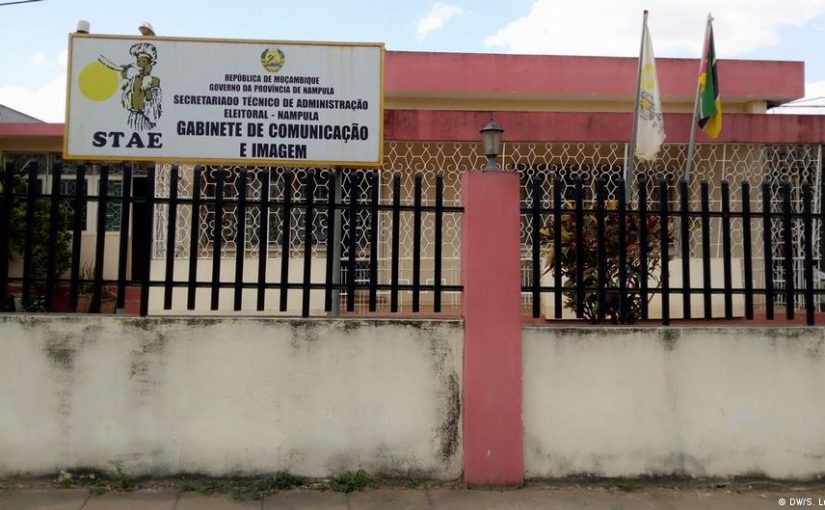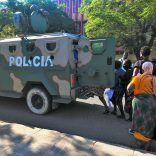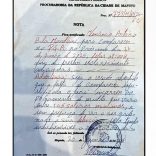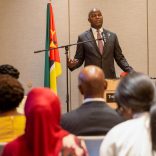Mozambique: CIP accuses Chapo of violating Public Probity Law - AIM
Mozambique Elections 1: Frelimo blocks new STAE head proposed by selection panel

File photo: DW
- Frelimo blocks new STAE head proposed by selection panel; CNE debate resumes tomorrow
The choice of the new Director General of STAE was postponed until tomorrow (Thursday 8 September) by the CNE, as Frelimo blocked the candidate chosen by the selection panel. The post has huge power because STAE runs the elections, and has been blamed for fraud and misconduct in the past.
Felisberto Naife resigned in March after 15 years as head of STAE (Secretariado Técnico de Administração Eleitoral, Technical Secretariat for Electoral Administration). The post was advertised and a selection panel of five members of the CNE (Comissão Nacional de Eleições, National Elections Commission) considered seven candidates. Top of the list was Loló Correia, director of STAE in Tete since 2014 – the only candidate who scored the maximum three points, and who was recommended by the panel
But Frelimo backed Helena Garrine, a water and sanitation engineer who has been national STAE director for training and civil education since 2014. She came 6th on the panel list with only one point. Some insiders argue Garrine was backed for business reasons. She is said to have the support of the central structure of the Frelimo party, which is pushing an influential businessman to supply election equipment. In contrast, Loló Correia has no Frelimo support.
Frelimo has a majority on the CNE and at the meeting yesterday (6 Sept) pushed for a vote. Renamo CNE members held out for following the panel recommendation. So the meeting was suspended until Thursday.
But Frelimo was also divided, with some members backing the number two on the panel list, Mario Cossane, who was head of STAE in Gaza when the vastly inflated voters list was produced in 2018-19.
On 17 August the panel chaired by journalist and CNE member Salomao Moyana evaluated and ranked the candidates. In order, they are: 3 with points Loló Correia; with 2 points Mario Cossane and Jose dos Santos Grachane; with1 point. Principe Lino Uataia, Jossias Gondachaco and Helena Garrine; and with 0 points Lucas Jose, lawyer and former head of STAE communications.
We are back
After reporting all of the multiparty elections since 1994, the Mozambique Political Process Bulletin returns to report local elections next year and national elections in 2024. We are based on a system of local correspondents – 463 in 2019, with at least three in every district – plus an editorial team in Maputo. Our team will be built up over coming months.
Since 2008 we have been part of CIP (Centro de Integridade Pública, Public Integrity Centre). Our emphasis has always been on accurate and sourced information from our team of correspondents, plus our own detailed investigations.
In 2019 we revealed both fraud and sloppiness. In Gaza there were more registered voters than there are adults in the province. And the CNE changed the final election results, in secret, twice, after they were told by the Bulletin that STAE and CNE had left out some voters and summed columns incorrectly.
Municipal elections calendar
- Registration: 20 February 2023 to 5 April 2023
- Voting: 11 October 2023
No money puts pilot registration in doubt
Little money is available for the election, which puts in doubt a pilot registration planned for October. Government told the CNE to seek donor money. However donors are saying they will turn a blind eye to another corrupt election but will not fund it.
A pilot registration to test equipment and train staff had been announced by the CNE but with no details.
The CNE has set a budget of $293 mn for the whole electoral process, of which $50 mn is for this year, $105 mn for 2023 and $136 mn for 2024. So far, government has only allocated $19 mn – less than half of what is needed for this year.
Recently CNE President Carlos Matsinhe noted that “the electoral bodies still face problems of various kinds, such as the lack of proper facilities and equipment for their full functioning, the tightness of the budget, among others, which imposes the greatest challenge to the full accomplishment of their mission”.
In terms of equipment, 4,400 registration units, briefcase computers to record data and issue voters’ cards, known as “Mobile IDs”, are required for the entire voter registration exercise. The CNE expects to buy 500 new Mobile IDs, to add to the existing ones, and accessories for the reuse of Mobile IDs from 2013/2014.
Mozambique currently has 53 municipalities with elected local governments. Registration next year will be in the entire district which contains a municipality. For the 53 districts, 14,789 electoral agents will be trained, including 70 facilitators, 1,129 provincial trainers, 5,033 Civic Education agents and 8,557 other brigade members.
Voters must register anew every five years.
Are more municipalities likely?
The possibility of creating new municipalities was raised in July by the Minister of State Administration and Public Service (MAE), who gave no other information. Studies of the territorial units that may be proposed to the Council of Ministers are underway at MAE. Little time is left before registration starts in February, and the proposal would need to be approved soon by the Council of Ministers to be submitted to Parliament for approval in the next session, starting in October.
Mozambique Political Process Bulletin – Municipal Elections 2023
- Editor: Lázaro Mabunda Director: Edson Cortez
- Advisor: Joseph Hanlon
- Communications Officer: Liliana Mangrove
Published by Centro de Integridade Pública (CIP https://www.cipmoz.org) and Joseph Hanlon [email protected]












Leave a Reply
Be the First to Comment!
You must be logged in to post a comment.
You must be logged in to post a comment.